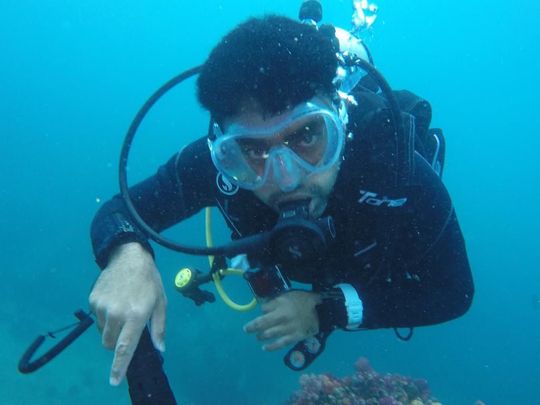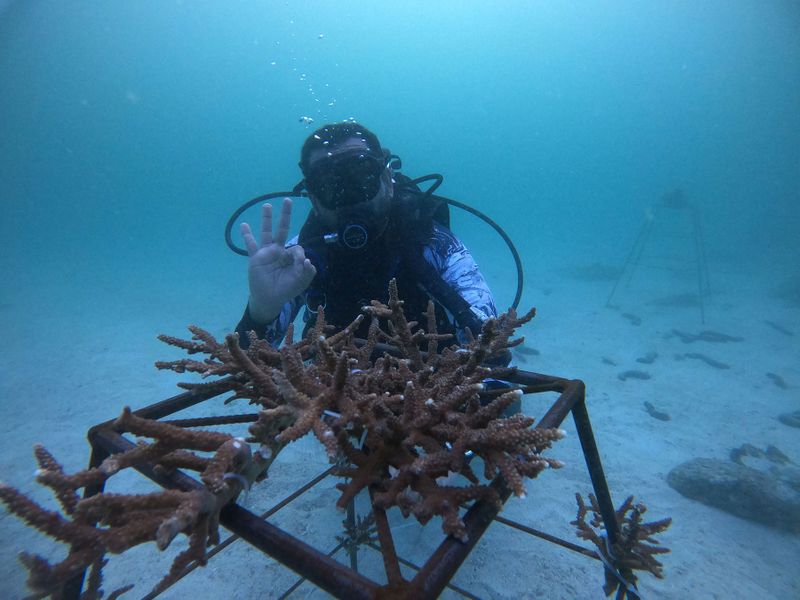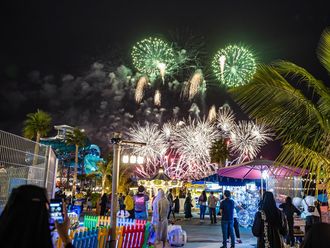
Dubai: A group of 25 volunteer divers, led by Emirati Saleh Mohammed Aldhuhoori, raised the UAE flag not up in the air but under the sea as they recently planted coral polyps off the coast of Khorfakkan in celebration of the UAE’s Golden Jubilee.
Launched by Emirates Draw, as part of its corporate social responsibility to local environmental causes and initiatives, the ‘Coral Reef Regeneration Programme’ is aimed at preserving and regenerating marine ecosystems in the UAE and beyond.
“As part of our celebration of the UAE’s 50th National Day, we would like to raise awareness in the adoption of best practice in sustainable management of coral reefs. A special shout out to Emirates Draw for their generous support in being the driving force behind this programme. We also would like to invite more volunteers to participate and enjoy the thrill of planting coral polyps during our dedicated dives,” Aldhuhoori told Gulf News.
“Since we are in our initial stage, more than 2,000 coral polyps have been planted so far. Spanning an area that stretches over 60 international football stadiums, we aim to plant more than 1.5 million coral reef colonies in the UAE and beyond,” he added.
Artificial structure
Aldhuhoori and his group sunk several steel frames on the seabed, where they attached the polyps with wire and marine epoxy. He explained the polyps they transplanted require a substrate or artificial base to grow, with access to sunlight.
The steel structures were embedded in relatively shallow water of between six to seven meters on the sandy seabed of Khorfakkan beach, in an area protected from dredging and fishing.

“While some environmentalists plant trees to fight deforestation, we are nurturing coral reefs to protect our marine life and environment,” Aldhuhoori underlined.
Home to marine creatures
Coral polyps are tiny, soft-bodied organisms related to sea anemones and jellyfish. They are covered with protective limestone skeleton called a calicle, which forms the structure of coral reefs.
According to Aldhuhoori, coral reefs are formed when a polyp attaches itself to a rock on the sea floor, then grows into thousands of clones. The polyps connect to one another to create a colony teeming with marine life.
“Corals are home to diverse aquatic species, including various fish and marine species – from the smallest shrimp to the largest predators. Sea creatures find both food and protection on coral reefs. Without these important habitats in which to thrive, fish and sea life will cease to exist,” he further explained.
UAE and beyond
Mohammad Alawadhi, managing partner of Emirates Draw, further explained the ‘Coral Reef Regeneration Programme’ is “an initiative to preserve and regenerate marine ecosystems in the UAE and beyond."
“The reason behind choosing the ‘Coral Reef Regeneration’ as our main programme is due to the fact that it is underrepresented, in serious decline globally and a point of concern to the UAE and the world. Our goal is to reach out and highlight the importance of coral reefs on our society and future from early on,” he added.
Alawadhi continued: “Our programme is one of a kind in the UAE. It entails surveying, planting, growing coral polyps and protecting them against any erosion or threats. The ambitious programme will work towards securing the future of marine biodiversity and is truly a way to pay it forward to ocean life and future generations.”
Aldhuhoori said they will return to check the artificial reefs they installed after one month. They also organise regular dives and they welcome any volunteers who would like to join them in their future dives, as they are an integral part of what they do.
If you are looking to join as a volunteer and contribute to the conservation of the marine realm, please contact Emirates Draw for more information on how to get involved.






